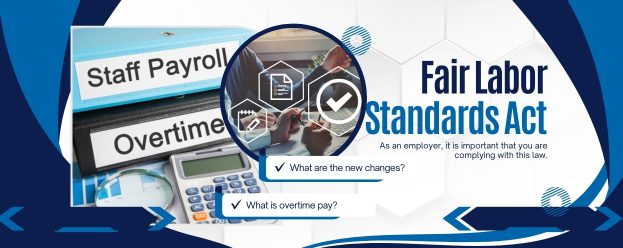24th Sep 2024

As a business owner, it is important to know the federal, state, and local laws that you must follow. One of those regulations that business owners must follow is The Fair Labor Standards Act (FLSA).
What is the FLSA?
The Fair Labor Standards Act is a United States Federal Labor Law enacted in 1938 that protects employees’ rights by establishing minimum wage, overtime pay eligibility, record keeping, and child labor rules. This affects full-time and part-time employees in the private sector and in the federal, state, and local governments.
What are the new changes going into effect?
To stay current, the FLSA is amended frequently. Beginning July 1, 2024, the Department of Labor (DOL) has increased the salary threshold needed to qualify for an employee to be considered exempt from the overtime pay requirements. This new rule increases the salary threshold to $43,888 ($844 per week) for a full time, full year employee from the previous $35,568 ($684 per week). Also, beginning January 1, 2025, the salary threshold will increase to $58,656 annually ($1,128 per week) for a full time, full year employee. Every three years, starting July 1, 2027, this salary threshold will automatically increase.
The annual salary requirement for the “highly compensated employee” exemption will also increase to $132,964 from the previous $107,432, effective July 1, 2024. This will increase to $151,164 on January 1, 2025. According to the DOL, a highly compensated employee is exempt from overtime if they:
- Earn total yearly compensation of $107,432 or more;
- Primarily perform office or non-manual work; and
- Regularly perform at least one of the exempt duties or responsibilities of an exempt executive, administrative, or professional employee.
It is estimated that these new changes will impact around 4 million employees.
What is overtime?
Employers must follow the FLSA to determine if an employee is or is not exempt from overtime work. Overtime pay is required whenever a non-exempt employee works more than 40-hours in a workweek. Non-exempt employees are typically paid an hourly wage and are entitled to overtime pay if they work more than 40-hours a week.
The standard overtime pay is usually time and a half (or 1 1/2 times your hourly pay) for every hour worked over a normal 40-hour work week. The FLSA salary threshold is the minimum salary that an employer must pay as part of the requirements for employees to be exempt from overtime pay. The DOL determines the salary threshold for the FLSA.
Who is eligible to receive overtime pay?
Not all employees are eligible to receive overtime pay. According to the FLSA, some employees are exempt from minimum wage laws and overtime pay. Employers must be well educated in each of their employees’ work status to run payroll correctly. In order for an employee to be exempt from receiving overtime pay, the employee must meet several different requirements under the most common category of exemptions, the “white collar” exemptions:
- The employee is paid a salary (a predetermined, fixed amount that does not adjust based on the amount of time worked);
- The salary is not less than the minimum weekly salary threshold; and
- The employee’s primary work performance includes specific job duties for executive, administrative, or professional roles. These are typically considered “white-collar exemptions.”
The DOL uses fact-intensive duties tests that determine whether employees are exempt or non-exempt from the overtime pay requirements.
What steps should an employer take to make sure they are compliant with this new rule?
It is imperative that employers familiarize themselves with the changes in this law. If an employer fails to properly distinguish exempt and non-exempt employees, it could result in a misclassification which could have serious legal and financial consequences for the business and employer.
For employers to be compliant with the new law, it is recommended that they do the following:
*Determine which employees are impacted by the threshold increases;
*Evaluate its business compensation systems;
*If the employer identifies employees currently classified as exempt that are paid below the threshold, the employer needs to decide if they should:
- Raise the employee’s salary to meet or exceed the threshold to maintain their exempt status; or
- Re-classify the employee to non-exempt status and perhaps limit hours worked. (It is important to weigh how doing this could impact the morale of your employees.)
*Ensure each employee is aware of changes that will be made to their compensation. Newly non-exempt employees, who may actually see the change as an adverse action, should be trained in the new changes. Employers should educate them on their scheduled hours, overtime policies, meal/rest breaks, as well as record and timekeeping responsibilities and requirements. It would be wise to also have this in writing for the employees.
Although this law recently went into effect, it is being challenged in various court proceedings and at least one state court has issued an injunction to prevent it from taking effect in that state. However, as of now Michigan employers must still make sure they are complying with the law. We will continue to update our blog with changes in this law.
Written by Michael C. Gibbons
Related Articles


